Everyone’s always looking for ways to get more done. We always focus on using systems to make productivity effortless. What most people don’t realize is food plays a big part in your productivity.
Adequate nutrition will increase your productivity by 20%. ~ WHO
The food we consume has a huge impact on the body. We know an unhealthy diet generally results in unhappy days. Hungry judges give harsher judgments. And toddlers who skip breakfast are more troublesome. (If you’re looking to quiet your toddler down, find a way to get them some food. Preferably the ones mentioned below.)
How does food affect your Productivity?
Nearly everything you eat is broken down into glucose. Glucose is the fuel you use to produce energy. Think about it. A bad breakfast can ruin your entire day.
The amount of glucose in your blood also affects your willpower.
To maintain peak performance, The brain works best with about 25 grams of glucose circulating in the blood stream – about the amount found in a banana. – According to Leigh Gibson, at Roehampton University.
Different foods break down at different rates. Foods such as bread, milk chocolate, wheat break down incredibly fast. This gives you a sudden burst in energy. The only problem is this energy dies out really quickly. And when it does, it leaves you tired.
Foods like eggs, fish and vegetables, break down at a more stable rate. Eating whole grain foods, that has some fat and protein it, allows your blood sugar to rise slowly and go down slowly. This allows you to have a stable blood sugar level all throughout the day. So the goal is to consume food that leaves you fresh throughout the day. And avoid food that leaves you tired in 20 minutes.
Keeping that in mind, here are 7 foods you should add to your diet for a more productive day.
1. Salmon
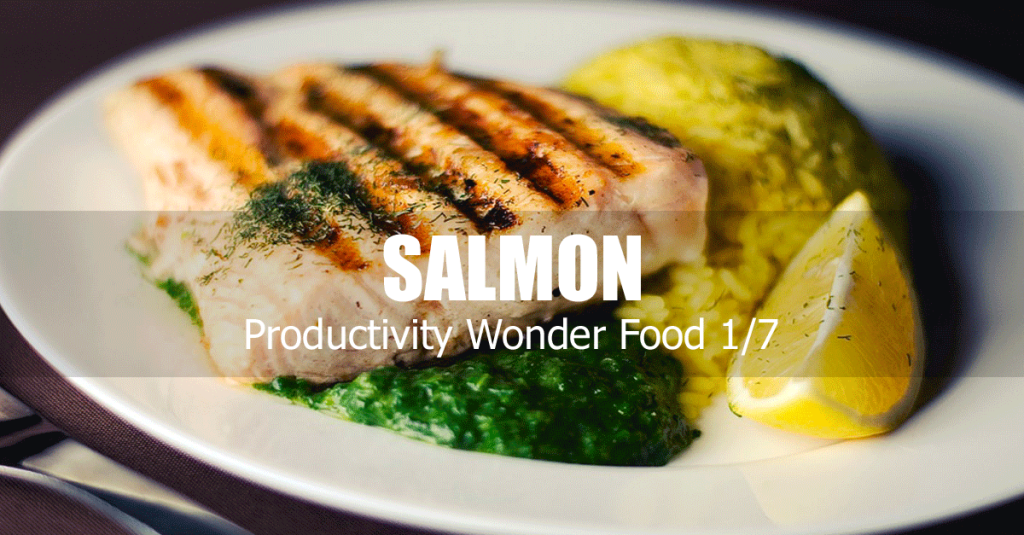
Fish! One word (and one digit) describe fish nutrients the best: omega-3. Omega-3 fatty acids are among the top healthy fats. Fish generally contain lots of omega-3 fatty acids. Why is salmon so healthy?
Salmon contains the two blockbuster omega-3s : DHA and EPA. These help in developing the eyes, brain and nerves. Your body can’t synthesize omega-3 fatty acids. It’s important you take them in the form of food. And one of the best sources for it is salmon. These fats are also great for the heart, hair, skin and eyes. But do they boost productivity? You bet.
The omega-3 fatty acids found in salmon help you boost your mood, improve both learning and memory. They’ll also help you protect yourself from depression and mood disorders. They are also responsible for producing neurological pathways. And help develop the brain in children.
In one of the largest studies of its kind, scientists analyzing the diets of 12,000 pregnant women found that children of those who consumed the least omega-3 were 48% more likely to score in the lowest quartile on IQ tests.
They are also neuro-protective in nature. The brain is 60% fat and most of it’s omega-3, DHA. It is critical for the brain to function healthy. The best part is salmon can even be cooked in a variety of ways with a variety of seasonings.
2. Ginger Root
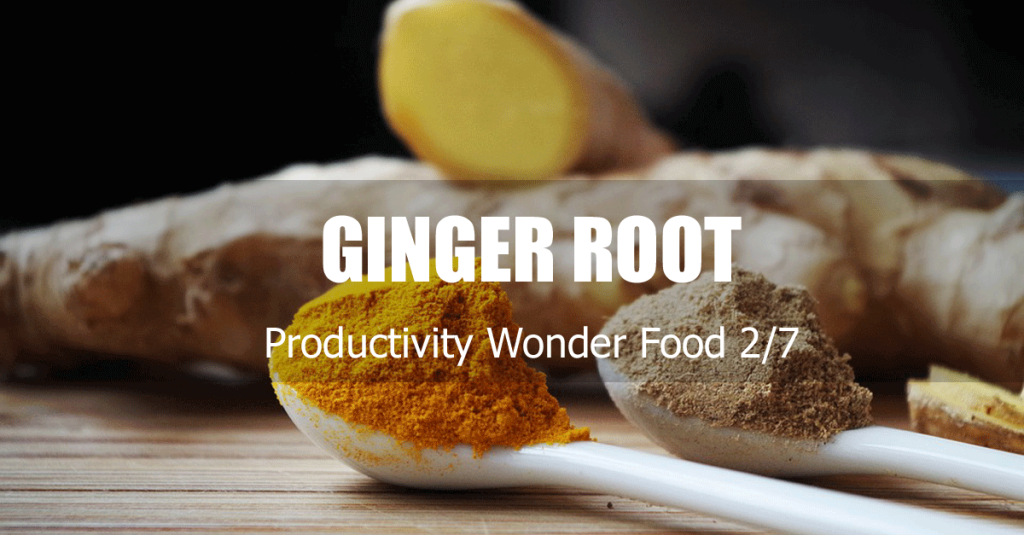
Ginger root is incredible in it’s own nature. It’s a true gift from the earth. Ancient Indian Ayurvedic Texts treat ginger as a medicine chest in itself. You may have been prescribed ginger for stomachaches. But it also has a host of other benefits for you.
Memory: ginger improves cognitive ability, according to research published in Evidence Based Complementary Medicine. Sixty participants were given either placebos or ginger extract for two months. At the end of two months those who were given the extract showed a significant improvement in cognitive performance and memory.
NeuroTransmitter Balance: ginger is a key player in neurotransmitter production. Ginger helps produce dopamine. Dopamine is the “reward molecule”. It’s a key player in being happy. Serotonine is the confidence molecule. Too much serotonine can cause mild symptoms like, shivering and diarrhea. And more serious symptoms like, muscle rigidity, fever and seizures. In cases of too much serotonine in the body, ginger helps maintain the balance.
Make Ginger Lemon Tea:
- Grind 2 inch ginger.
- Add 4–5 cups of boiling water.
- Boil for 3 minutes and strain.
- Add 1 tsp of lime juice and jaggery.
Consume Ginger Juice:
Extract ginger juice. Store in refrigerator for 5–6 days.
Mix 2 tsp ginger juice + 2 tsp honey. Consume every morning on an empty stomach.
3. Broccoli
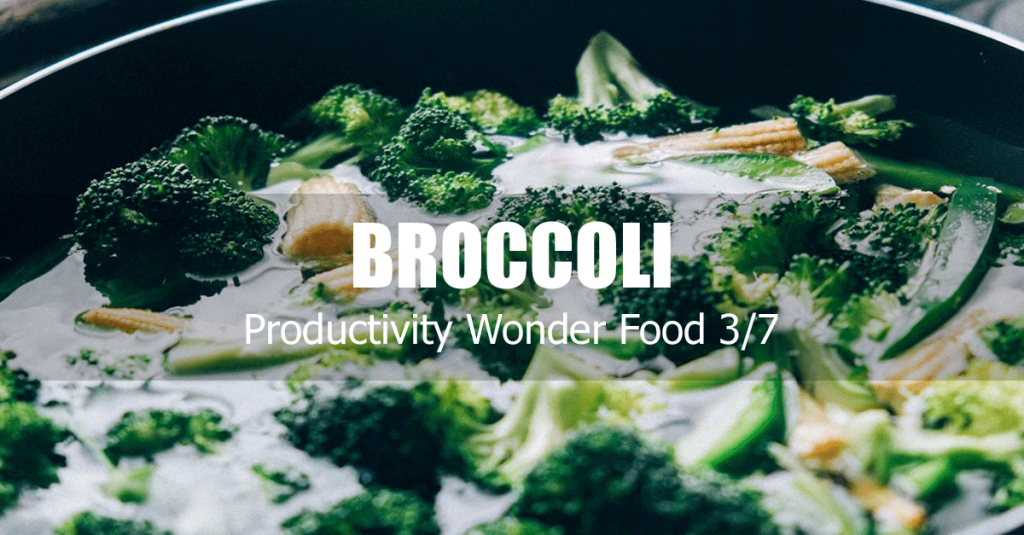
Broccoli is considered to be a superfood. And rightfully so. Its packed with nutrients like most greens. Its been recommended for its health benefits. These range from preventing cancer, to reducing cholestrol and even improve detoxification.
Its rich in vitamins C, A and K. Vitamin K helps improve cognitive skills and brain function. Broccoli is high in a compound called lignans too. It helps you improve thinking, reasoning, imagining, remembering and learning words.
Broccoli also has high potassium content. This allows the human brain to function optimally maintaining a healthy nervous system. The healthy dose of antioxidants in broccoli give it its detoxification properties.
4. Spinach
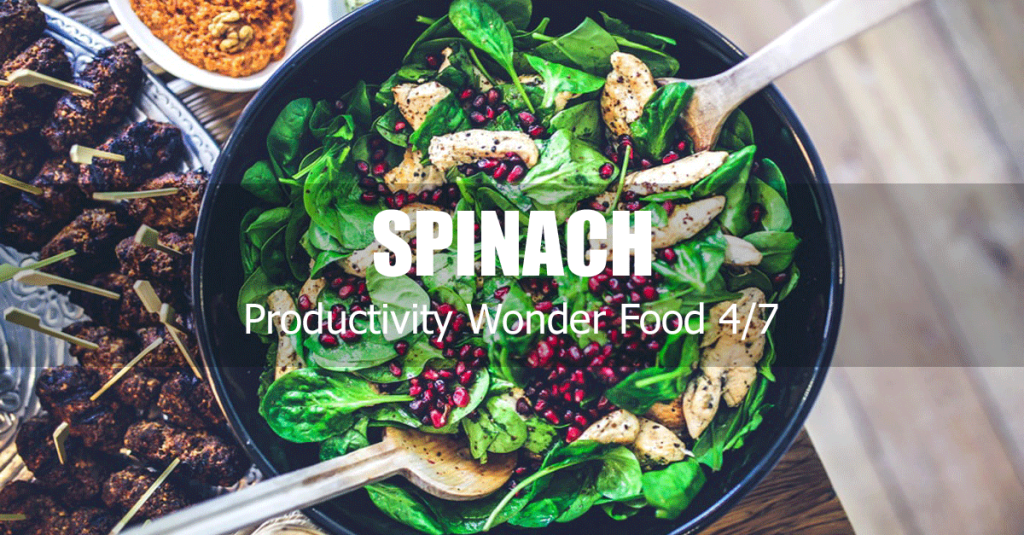
Leafy greens are packed with health benefits. On an average people who consume leafy greens once a day halted mental decline by a whopping 11 years!
And spinach is a gold mine among the leafy greens. Remember it has also been the open secret to Popeye’s awesomeness for years now. It is even considered to be one of the world’s most healthiest foods.
A study of more than 200 women found that folate and vitamin B6, found in spinach helped improve mental ability and short term memory.
Spinach is rich in antioxidants too. As you grow older free radicals begin accumulating in the brain. This leads to a decline in cognitive functioning and your overall well-being. The antioxidants found in spinach help your body release these free radicals.
Spinach contains L-tyrosine. L-tyrosine is a natural precursor in the production of a whole bunch of active substances in our body. Among some of them is melanin, the compound that protects the skin from UV rays and gives it color. L-tyrosine is also a precursor to neurotransmitters such as dopamine. This helps you maintain well balanced concentration and reduces stress in the body.
Spinach is also great for your eyes. It has a healthy dose of iron to keep your blood healthy.
5. Blueberries
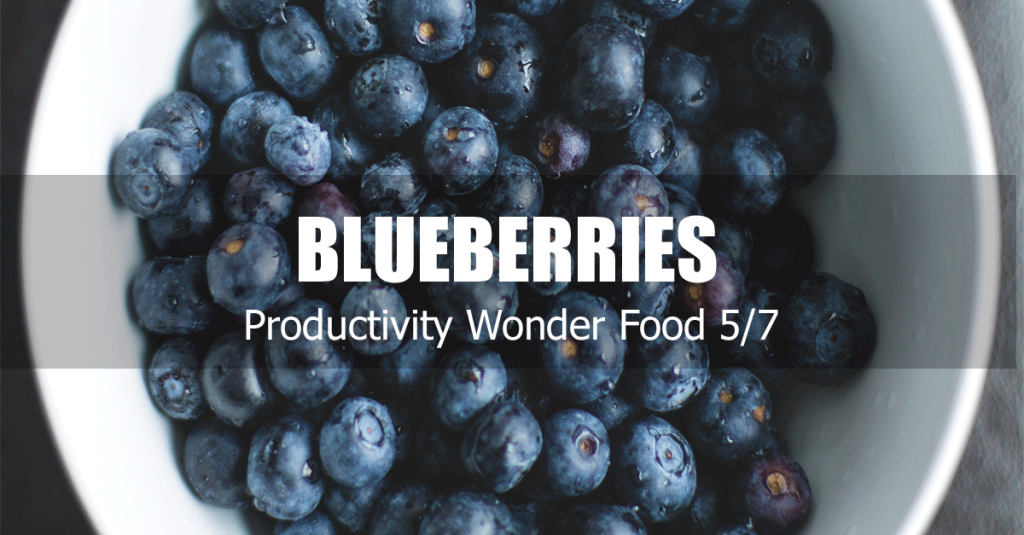
Ah. Fruits. Blueberries are our favorite pick. Blueberries contain high amounts of antioxidants. And they contain a huge variety of antioxidants too.
These antioxidants help you increase memory potential, reduce blood pressure. Some animal studies suggest they even help fight cancer.
Blueberries are low in calories and high in nutrients. Like ginger root, blueberries also help reduce DNA damage. In other words they are pro anti-aging.
A few animal studies suggest that the antioxidants from blueberries accumulate near the intelligence centers of the brain. They interact with aging neurons improving cellular communication. Blueberries are the perfect productivity boosting fruit.
Smoothies, pancakes, and pies are some of our favorite ways to consume blueberries.
6. Coffee
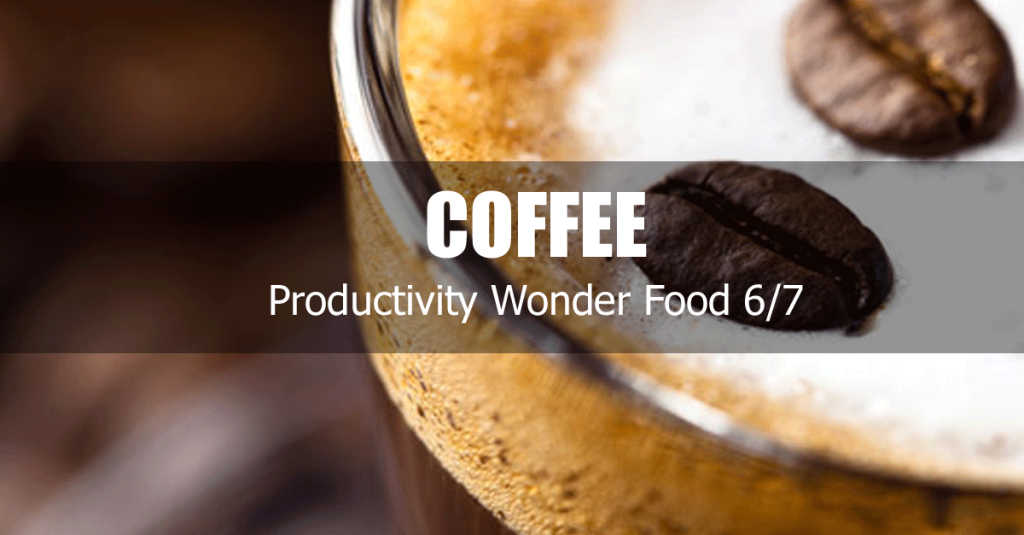
Coffee is the most consumed psychoactive substance in the world. The wonderful effects of caffeine were first noticed when cattle consumed shrubs containing caffeine. It was noticed that these cattle were more energetic than the rest.
A lot of us consume coffee to stay awake. This is because it blocks out the adenosine receptors in the brain. This makes the brain think the body wants to be wide awake. As more of the adenosine gets collected in the receptors, you feel like sleeping.
By blocking off adenosie, coffee increases neuronal firing in the brain. This releases neurotransmitters like dopamine, serotonine and norepinephrine. This means coffee actually makes you smarter. Neurotransmitters such as these boost concentration and improve your mood drastically.
Coffee also releases catecholamines (like adrenaline). This helps muscles contract better improving physical coordination. This lets your heart beat faster, providing more blood to your muscles. And it tells your liver to release sugar into the blood stream for more energy. Genius isn’t it?
Coffee is the biggest source of antioxidants in the western diet. Study after study reveals the daily intake of coffee reduces the risk of cancers like oral, uterine, prostrate, brain, liver etc.
7. Eggs
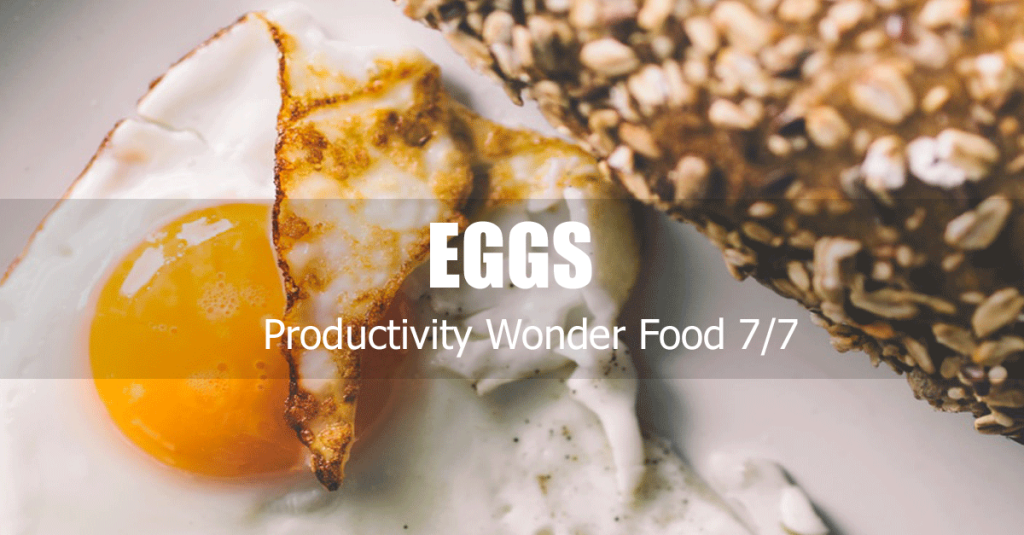
Eggs are the best way to start your day. As we have already discussed breakfast is the most important meal of the day. If you eat your breakfast intelligently you will spend your entire day intelligently. Its the best time to load up on all the foods that raise blood glucose levels slowly and keep them stable throughout the day. And an egg is perfect for this.
Eggs also help you boost memory and cognitive skills. How? They produce choline. A nutrient most people don’t enough of. Choline helps establish healthy neurological pathways.
Brain Shrinkage is a precursor to Alzheimer’s disease. Eggs contain B-12 vitamins and omega-3 fatty acids. These help maintain a balance in brain volume.
Do eggs make you happy? You bet. Scrambled eggs are considered to be one of the best comfort foods out there. You know what to serve, when someone is feeling blue. The vitamins B12 and B6, reduce stress and give you happy nudge. The amino acids in eggs are even believed to have antidepressant properties.
Eggs like salmon have healthy fats in them. Not all fats are bad for you. These fats are even filling. This is why you can eat little and still get the best benefits.
You should definitely consume eggs for breakfast if you want to have a good mood, energy and focused attention throughout the day.
The key is to find out what works for you. This list hopes to have introduced you to healthy foods that’ll keep your productivity high throughout the day. The right foods will help you live an extraordinary life.




Great piece of information. You shared valuable nutrition tips. Thanks a lot.
Thanks for your feedback!